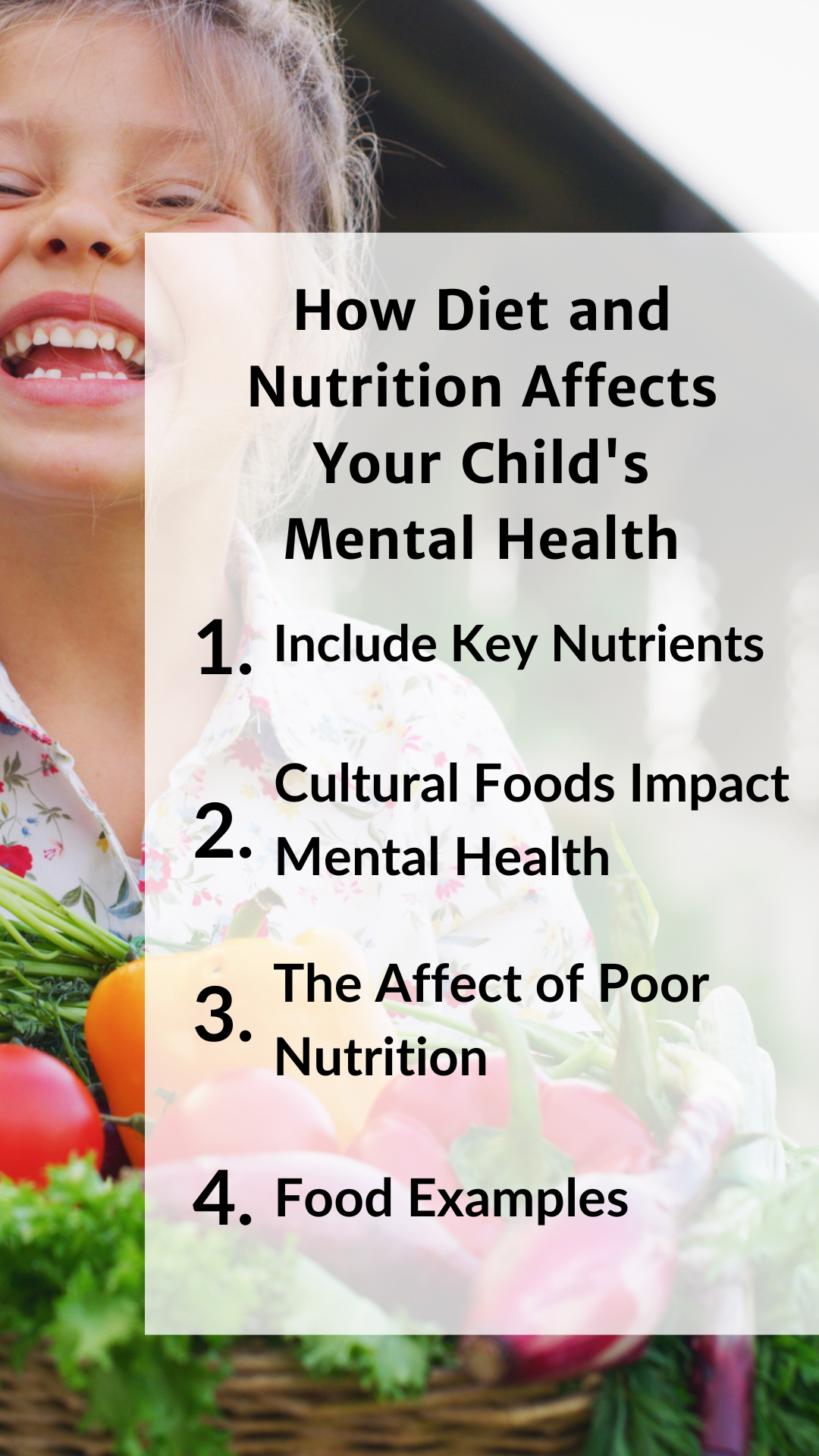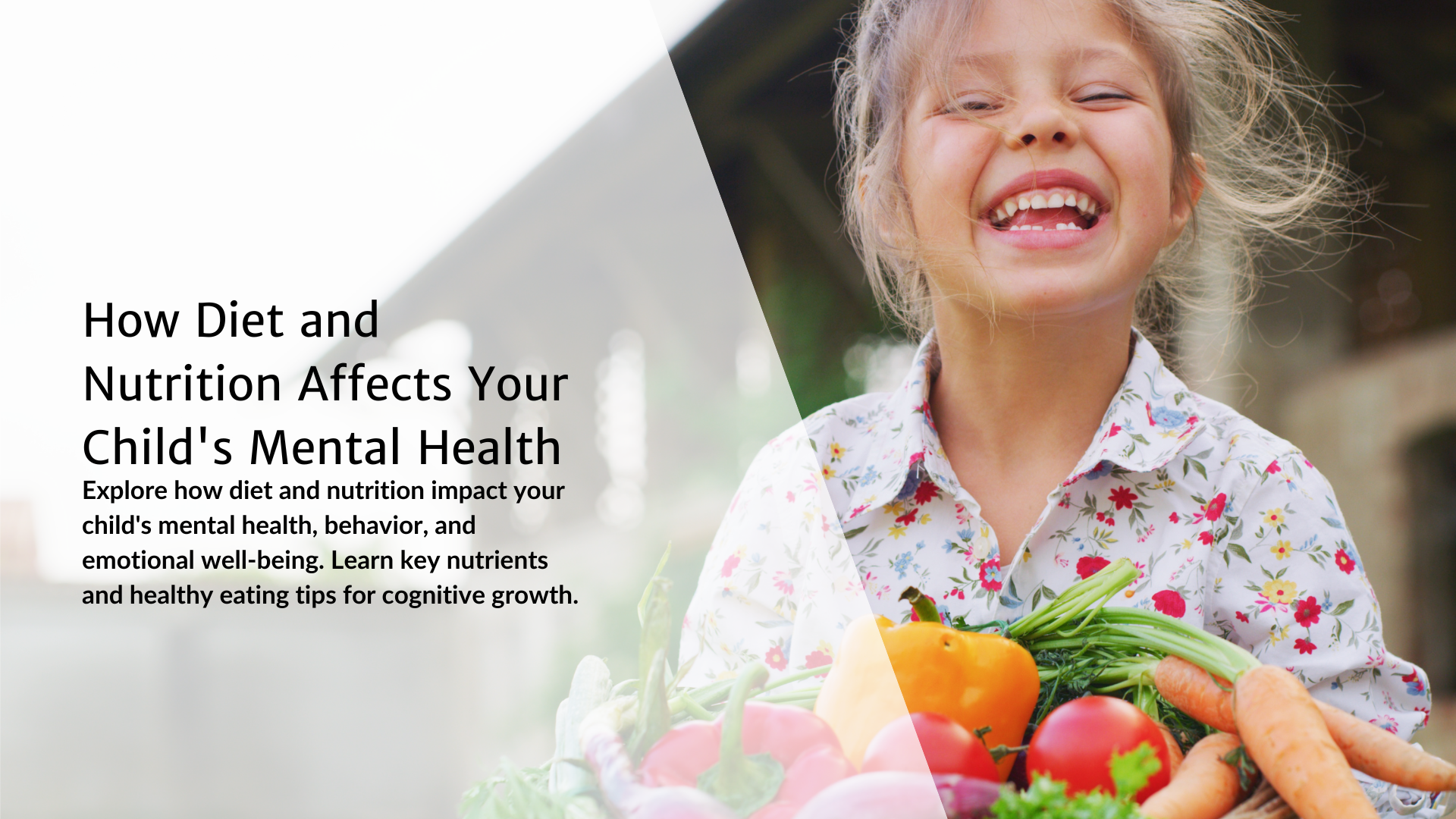When we think about nutrition, we often focus on physical well-being, but a child’s diet plays a critical role in their mental health too. Nutrition impacts brain development, emotional stability, and mood regulation, directly influencing how children cope with stress and daily challenges. In this guide, we’ll explore the vital connection between diet and child mental health, and how parents, caregivers, and nutritionists can make informed choices to support emotional well-being.
The Connection Between Child Nutrition and Mental Health
What your child eats can have a profound effect on their mental and emotional well-being. A balanced diet rich in essential nutrients supports brain development, mood regulation, and emotional stability. Foods high in vitamins, minerals, healthy fats, and proteins can enhance concentration, reduce anxiety, and improve overall mood.
On the other hand, diets high in processed foods and sugars can disrupt emotional balance. Sugar spikes, followed by energy crashes, often result in irritability and difficulty concentrating. Processed foods lacking in essential nutrients may leave children feeling sluggish and emotionally unstable.
Understanding the link between nutrition and mental health empowers parents, caregivers, and nutritionists to make healthier food choices that can positively impact a child’s emotional resilience. Simple adjustments, such as incorporating more fruits, vegetables, whole grains, and lean proteins, can make a significant difference in how a child feels and handles stress.
Key Nutrients for Cognitive and Emotional Growth
To support your child’s mental health, it’s important to focus on key nutrients that promote both cognitive growth and emotional well-being:
- Omega-3 Fatty Acids: Found in fish, flaxseeds, and walnuts, omega-3s are vital for brain development and have been linked to reduced anxiety and depression in children.
- B Vitamins: B vitamins, especially B6, B12, and folate, play a significant role in energy production and mood regulation. They are found in foods like whole grains, leafy greens, and eggs.
- Iron: Essential for transporting oxygen to the brain, iron supports cognitive function. Foods rich in iron include lean meats, spinach, and beans.
- Magnesium: Known for its calming effect on the nervous system, magnesium helps reduce stress. It can be found in nuts, seeds, and leafy greens.
- Zinc: Zinc supports brain function and immune health. Foods like beef, chickpeas, and pumpkin seeds are excellent sources.
Cultural Foods and Their Impact on Mental Health
Incorporating cultural foods into your child’s diet not only ensures they receive a balanced nutritional profile but also helps them connect with their heritage, which can offer emotional comfort and a sense of identity. These dishes can be a source of both nourishment and emotional grounding, highlighting the importance of food in mental and emotional well-being.
Here are some examples of culturally significant foods that offer both nutritional benefits and emotional support:
- Mediterranean Diet:
- Dishes: Greek salad, hummus, lentil soup, grilled fish
- Nutritional Benefits: Rich in healthy fats from olive oil, omega-3s from fish, fiber from legumes, and antioxidants from fresh vegetables, all of which support brain health and mood stability.
- East Asian Cuisine:
- Dishes: Miso soup, stir-fried tofu with vegetables, sushi with seaweed, brown rice
- Nutritional Benefits: High in protein, vitamins, and minerals from ingredients like tofu, seaweed, and nutrient-dense vegetables. Fermented foods like miso can support gut health, which is linked to improved mood and emotional well-being.
- South Asian Cuisine:
- Dishes: Lentil curry (dal), turmeric-spiced dishes, chickpea stew, whole grain roti
- Nutritional Benefits: Packed with fiber, protein, and anti-inflammatory spices like turmeric and cumin, which can help reduce stress and support cognitive function. Lentils and chickpeas provide B vitamins that are essential for energy and mood regulation.
- Latin American Cuisine:
- Dishes: Black beans and rice, grilled corn, avocado salad, ceviche
- Nutritional Benefits: Rich in fiber, healthy fats, and protein. Avocados are a great source of omega-3s, while beans and whole grains support stable blood sugar levels, promoting emotional balance.
- West African Cuisine:
- Dishes: Jollof rice, okra stew, grilled plantains, peanut soup
- Nutritional Benefits: High in fiber, protein, and heart-healthy fats. Ingredients like leafy greens, plantains, and peanuts are rich in vitamins and minerals that support brain health and emotional stability.
- Middle Eastern Cuisine:
- Dishes: Tabouleh, falafel, baba ghanoush, chicken shawarma
- Nutritional Benefits: Whole grains, lean proteins, and fiber-rich vegetables form the base of many dishes. The use of spices like sumac and herbs like parsley offers antioxidants that support mental clarity and reduce inflammation.
The Impact of Poor Nutrition on Child Mental Health
While good nutrition supports mental health, poor dietary habits can have a detrimental impact. Diets high in sugars, unhealthy fats, and processed foods have been linked to increased rates of anxiety, depression, and behavioral problems in children.
Excessive sugar intake, for example, can lead to hyperactivity followed by energy crashes, resulting in mood swings and irritability. Unhealthy fats and processed foods can contribute to inflammation, which affects the brain and mental health. By reducing processed food consumption and prioritizing nutrient-dense meals, parents can help protect their child’s mental health from the negative effects of poor diet.
How to Promote Healthy Eating Habits
Promoting healthy eating habits doesn’t have to be complicated. Simple changes in your child’s diet can have a significant impact on their mental health:
- Offer a Variety of Foods: Introduce a range of fruits, vegetables, whole grains, and proteins. The more diverse the diet, the more likely your child is to get the nutrients they need.
- Involve Your Child in Meal Planning: Let your child help choose nutritious foods during grocery shopping. This involvement encourages them to try new, healthy foods and makes mealtimes more engaging.
- Limit Processed Foods: Reducing the intake of processed snacks and sugary treats can improve mood stability and energy levels.
- Encourage Cultural Foods: Emphasize the importance of traditional foods that are rich in nutrients and offer emotional connections to family and heritage.
Healthy Eating for Kids: What Does It Look Like?
Healthy eating for kids involves a balanced diet that provides the necessary nutrients for physical and mental growth. Key components of a healthy diet include:
- Fruits and Vegetables: Full of vitamins, minerals, and antioxidants that support brain health.
- Whole Grains: Brown rice, oats, and whole wheat bread provide energy and help with focus and mental clarity.
- Lean Proteins: Chicken, fish, beans, and eggs provide essential amino acids that promote brain development and emotional regulation.
- Healthy Fats: Avocados, nuts, and olive oil are excellent sources of omega-3 fatty acids that support brain health and emotional balance.
Conclusion: Supporting Mental Health Through Nutrition
The bottom line is that diet and nutrition are fundamental to your child’s mental health. A balanced diet, full of key nutrients, supports both their cognitive development and emotional well-being, contributing to a healthier mind and body. Adding cultural foods to their meals not only boosts nutrition but also provides emotional comfort and a sense of connection, making mealtimes a truly enriching experience in every way.
At Mente Counseling, we recognize the importance of holistic care. Our team offers therapy services that address both mental health and the role of nutrition in emotional well-being. Contact us today to learn more about how we can support your child’s mental and physical health journey.
FAQs
How does nutrition affect a child's mental health?
How does good nutrition affect a child's behavior?
What is healthy eating for kids?
What are the best nutritional foods for kids?

